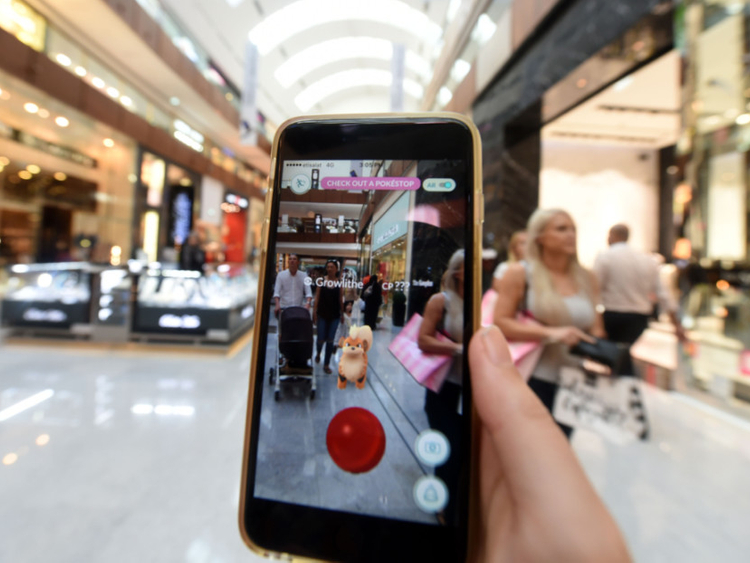
Do you play Pokemon Go? If your answer is yes, you’re one of the few million users who have downloaded the app. Pokemon Go, which was released in some countries on July 5, has won over 100 million people, as stated by Engadget, a technology blog network. But, is the game leading to people being disconnected from the world? Gulf News readers who play the game don’t seem to think so.
Majid Almheiri, an Emirati student based in Sharjah, downloaded the game as soon as he heard about it. When he first started playing, he would walk around his neighbourhood, hunting for Pokemon, or ‘pocket monsters’. Despite it being over 40C outside, Almheiri wanted to continue playing so he could “level up”.
He said: “I was competing against my friends. I found out that at level five you get to choose teams — instinct, mystic and valour. My friends all chose valour and I was the only one who chose mystic. I would take down valour gyms and make them mystic on my own.”
In case you don’t know what that means, Pokemon Go has gyms located in certain areas, which are the scene of battles against other Pokemon ‘trainers’. So, players from two different teams would fight for the title. Once you win, you have the option to leave one of the Pokemon that you have collected at your team’s gym to aid in its defence.
In his quest to succeed, Almheiri found other players of the mystic team and befriended them. But, a lot of people are concerned that Pokemon Go players are being careless. When walking around, Almheiri says he did become absent-minded sometimes, but he never lost his “grip on reality”.
“I knew my boundaries and was aware to not trespass to capture a gym on private areas,” he said.
Fortune, a US-based business magazine, stated that the popular mobile game brought in more downloads during its first week on the Apple App store than any other app ever. One of the reasons could be the new generations connect with the Pokemon series.
Maxine Dawis, a Filipina student who is currently on a holiday in Dubai, watched the Pokemon cartoons growing up. Thus, the game brought back memories. It soon became addictive because it was something interactive that pushed her out of her comfort zone.
She said: “It has definitely pushed me to travel more. I can catch more Pokemon while sightseeing, and it can be fun to play with friends, too. People hunt Pokemon in groups. It’s better that way.”
In the process of looking for these fictional species, Dawis once almost got into trouble. As she pointed her phone towards a Pokemon, she didn’t realise it looked as if she was photographing a couple at Dubai Mall. “They thought it was weird, and I was a bit embarassed, but ended up catching the Pikachu,” she said.
Another popular factor of the game is its augmented reality, which got Salman Khan, an Indian programme manager based in Dubai, hooked. Having downloaded the app out of curiousity, Khan soon became addicted due to its “unique concept”. In his opinion, it is a great tool to promote businesses.
He said: “I once went hunting with a couple of friends in an area close to my house when someone started a lure there. All I could think about was how this is great for companies to have more people visit their stores — a new era in the world of marketing and advertisment.”
Unfortunately, Khan’s journey did not last very long as he was forced to quit due to server issues. But, while it lasted, Khan says he felt more connected to the world despite being on his phone.
Lynne R., a Canadian national based in Sharjah, played the game extensively when she was visiting Canada and Rome during the summer. When younger, Lynne watched the cartoons, collected Pokemon cards and played all its games. So, the idea of playing in the real world was “a very exciting prospect”.
She said: “Playing Pokemon Go has made all the walking around and waiting much more engaging and interactive. I’m paying more attention to what’s around me, finding art and other things being used as pokestops, even occasionally going off my usual route to find Pokemon. It keeps me switching things up and makes normally boring, routine trips more interesting.”
To save battery on their phones, her group of friends go hunting together. With one friend acting as the lookout, the others log in the minute a rare Pokemon is spotted.
She said: “In my hometown in Canada, people put lures out in specific parks where several pokestops overlap in one spot every night. So, my husband and I went out a few times to those spots. And I actually felt safer being out at night than ever before. With so many people gathered calmly in one place for the same purpose, we would just strike up conversations with people we’d never met before; we even made new friends. People who are inclined to do adventurous or dangerous things will do them whether they have a technology as an excuse or not. Whether the game is good or bad depends on the person engaging with it.”
While on vacation in Rome, Lynne and her husband walked 60 kilometres, which she says was mainly for sightseeing, but catching a Pokemon or two along the way was appreciated.
Anjana Pisharody, a psychology graduate based in Sharjah, has a lot of friends playing the game. In her opinion, it is a way for gamers, who are usually “loners”, interact with the outside world.
She said: “They meet people and talk. It helps them build confidence. I don’t think it has any negative effects. If you’re in a social setting, you can get everyone to play. I don’t play, but I become curious when with my friends. In the UAE, obesity is a big concern. If this app is allowing people to walk to a certain extent, then let them.”
So, is the game good or bad? You decide. But, whether you like it or not, the game has taken the world by storm. And it continues to grow in number every day.











